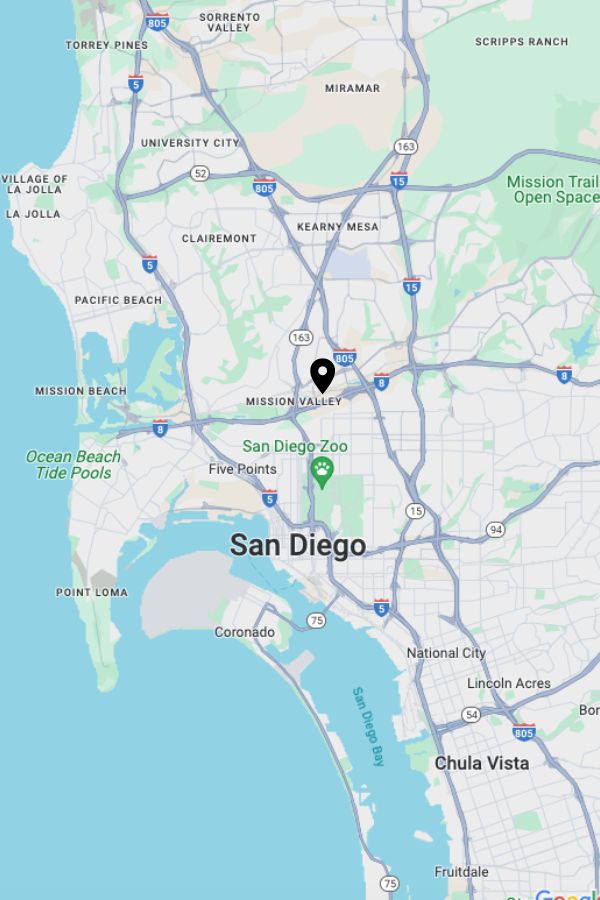Apex Recovery operates multiple rehab facilities in California and Tennessee, offering comprehensive addiction treatment services. With a focus on personalized care and evidence-based therapies, our centers provide support and resources to help you achieve lasting recovery. Contact us today to begin your journey toward a healthier, substance-free life.
Apex Recovery collaborates with numerous health insurance providers, ensuring accessibility to our residential substance abuse treatment programs. By accepting insurance coverage, we aim to lower financial barricades and make your path to residential recovery within reach. Contact us to verify your insurance benefits and explore the options available for your residential rehabilitation journey. You can visit our Insurance page.

What is an Inpatient / Residential Rehab Facility?
An inpatient or residential rehab facility provides intensive, 24/7 care for people struggling with substance abuse or addiction. Unlike outpatient residential addiction programs, which allow patients to return home after treatment sessions, inpatient rehab requires patients to reside at the facility for the duration of their program, typically ranging from 28 days to several months.
This immersive environment offers structured living and a supportive setting where you can focus solely on your recovery without the distractions and triggers of everyday life. Inpatient rehab facilities offer a range of therapeutic interventions, including individual and group counseling, medication management, behavioral therapy, and holistic approaches such as yoga or art therapy. Additionally, patients benefit from constant supervision and medical support to ensure their safety and well-being throughout the detoxification process and beyond.
Explaining the Key Differences Between Inpatient and Residential Treatment
Inpatient and residential addiction treatment programs both offer immersive environments for addiction recovery, yet they differ primarily in their setting and intensity of medical care. Inpatient treatment is typically situated within a hospital or clinic, providing acute medical care and supervision. This setting is often reserved for those requiring detoxification or stabilization from severe substance use disorders.
Conversely, residential treatment takes place in a more home-like environment, offering a blend of structured therapy programs and a supportive community. While it still provides 24/7 care, the focus goes beyond immediate medical intervention and includes comprehensive behavioral therapy, life skills development, and long-term recovery planning. Both settings aim for the same outcome—sustained sobriety—but cater to different levels of patient needs, balancing medical oversight with the therapeutic process.
Explaining the Key Differences Between Outpatient and Residential Treatment
Outpatient treatment programs provide flexibility and independence, allowing you to continue with your daily life, such as work or school, while receiving treatment for substance abuse or mental health issues. These programs typically involve scheduled therapy sessions several times a week, focusing on rehabilitation through counseling, education, and support groups.
In contrast, residential (live-in treatment) requires people to live at the treatment facility, offering a more immersive and intensive therapy experience. This environment is designed to remove patients from potential triggers and stresses of their regular environment, providing 24/7 care and support. Residential programs are structured, providing a range of therapeutic activities and therapies, aimed at addressing the root causes of addiction and facilitating long-term recovery.
Explaining the Key Differences Between Partial Hospitalization Program and Residential Treatment
A Partial Hospitalization Program (PHP) offers intensive, structured therapy during the day, similar to residential treatment, but patients return home or to a supportive living environment at night. It provides a comprehensive approach to recovery, including therapy, counseling, and medical supervision, while allowing people to maintain some independence.
Residential treatment, however, requires patients to live at the facility full-time, offering 24/7 support and a highly structured environment to address addiction and mental health issues.
Statistics on Drug & Alcohol Inpatient / Residential Treatment
In the United States, 19 million individuals aged 12 and older were identified as needing substance abuse treatment, yet only a fraction, 964,000, acknowledged this need. Among them, 392,000 received treatment for Substance Use Disorder (SUD). Specifically, among the 946,000 adolescents who needed treatment, only 159,000 received it.
For young adults aged 18-25, a mere 1.6% of the 5.2 million in need accessed treatment. Treatment for Alcohol Use Disorder (AUD) was received by 2.2 million people across all ages, with a gender distribution of 1.4 million males and 791,000 females. Only 2.1% of those with AUD underwent Medication-Assisted Treatment (MAT). Residential facilities operated at a 79% bed utilization rate, with 5% of clients in residential programs—3% in long-term residential care, 2% in short-term programs, and less than 1% in residential detox.
Free Addiction Assessment
Schedule a free, confidential assessment with a licensed clinician. Apex Recovery can check your insurance coverage levels for drug and alcohol addiction, and mental health treatment.

- Please complete and send the form below.
- One of our staff members will contact your insurer to check your coverage.
- We will contact you promptly with the results and to discuss the next steps.
Insurance Verification
"*" indicates required fields
Finding Residential / Inpatient Substance Abuse Treatment Centers Near Me
Are you seeking residential or inpatient substance abuse treatment centers nearby? Take the first step towards recovery by calling Apex at (877) 881-2689. Our dedicated team can guide you through the process and help you find the right local facility tailored to your needs. Don’t wait any longer—reach out today to start your journey towards a healthier, substance-free life.

Residential / Inpatient Centers in Tennessee
Apex Addiction Recovery Center in Tennessee proudly operates two residential/inpatient treatment centers in the state. Our Franklin location, situated at 4601 Carothers Pkwy STE 250A, Franklin, TN 37067, offers comprehensive care in a serene environment. Additionally, our Columbia facility, located at 2710 Trotwood Ave Suite A, Columbia, TN 38401, provides dedicated support and guidance on their journey to recovery.
Apex Recovery Franklin
4601 Carothers Pkwy STE 250A
Franklin, TN 37067
Apex Recovery Columbia
2710 Trotwood Ave STE A & B
Columbia, TN 38401
Free Addiction Assessment
Schedule a free, confidential assessment with a licensed clinician. Apex Recovery can check your insurance coverage levels for drug and alcohol addiction, and mental health treatment.

Mental Health and Addiction Center in California
While Apex Recovery doesn’t offer residential treatment in San Diego, we’re dedicated to providing individualized care. One of our trained professionals can help assist in placing our patients in residential programs with one of our trusted partners. Apex Recovery also offers a multitude of other treatment services. Located at 2810 Camino del Rio S #106, Apex Addiction Recovery Center in San Diego, California, is a symbol of hope and restoration for those seeking recovery from substance abuse.
Apex Recovery San Diego: 2810 Camino del Rio S #106 San Diego, CA 92108
Who Should Choose Inpatient Rehab?
Every person enters a treatment program with different needs. Our unique experiences, relationship with addiction, and where you are at in your life currently can inform the decision of which treatment program is right for you. By gaining a better understanding of what the benefits of a residential, inpatient treatment program are, you’ll be able to find the treatment program that offers the right level of resources and care for your needs.
Inpatient treatment carries with it a number of benefits when compared to less intensive alternatives like outpatient treatment. These include but are not limited to the following:
In a residential treatment program, you will be fully immersed in the recovery process. The only work you have to do while you are in an inpatient recovery program is learning the skills and strategies that will help you succeed outside of the treatment center. As such, you’ll be able to invest yourself in your recovery fully.
Inpatient programs offer fewer distractions than an equivalent outpatient program.
In an inpatient program, you have a much lower chance of relapse during the duration of the program since you won’t be around the same triggers and environment that gave rise to your addiction.
If you feel like you need the security and comprehensive care that is offered in a residential treatment program, then an inpatient program is probably right for you.
When Should Seek Inpatient Treatment?
There is no hard and fast rule for when someone should seek out inpatient treatment. Inpatient treatment isn’t necessary in all cases, and in some situations, an outpatient treatment program can offer the right balance of intensive work with time away from treatment. If you have struggled with overcoming your addiction in the past and relapsed, an inpatient treatment program may be the right choice for you. The structured nature of an inpatient program keeps you focused on your treatment for the duration of your stay and limits the opportunity to relapse while you build the skills that can help you overcome your addiction in the long term.
Inpatient treatment programs also include a detox component. If you have experienced withdrawal symptoms when you have tried to stop your substance abuse and anticipate that you’ll incur withdrawal symptoms again, an inpatient treatment program might be a good fit for you. Inpatient treatment starts with the medical supervision of the detoxification process that will help you navigate the worst of your withdrawal symptoms in a safe environment.
Ultimately, which type of treatment program you enter is your choice. If you feel like you need access to the highest level of care, medical management of the detox process, and continuous engagement with recovery without all of the distractions of your normal life, then an inpatient recovery program may be ideal.

What is Treated at Residential Drug & Alcohol Rehab Centers
Residential rehabilitation centers provide drug treatment and alcohol and comprehensive care for substance abuse disorders, including addiction to alcohol or drugs, including opioids, benzodiazepine, and stimulants. Search online for “residential addiction treatment near me,” or come straight to Apex Substance Addiction Recovery Center, where we offer a range of therapies and interventions that address the physical, psychological, and emotional aspects of addiction to facilitate lasting recovery and sobriety.
Treatment for Opioids (e.g., Heroin, Opiate, Prescription Painkillers) at an Addiction Residential Center
At addiction residential centers, treatment for opioid addiction, including substances like heroin, opiates, and prescription painkillers, typically involves a multifaceted approach. This may include medically-assisted detoxification to manage withdrawal symptoms, followed by comprehensive therapy modalities such as cognitive-behavioral therapy (CBT), individual counseling, group therapy, and support groups.
Additionally, medication-assisted treatment (MAT) may be prescribed to help reduce cravings and prevent relapse, with close monitoring and adjustments made by medical professionals to ensure safety and effectiveness throughout the recovery process.
Treatment for Alcohol Addiction at a Residential Treatment
During residential alcohol treatment near me (if you’re in San Diego or Tennessee) people undergo a structured program to address the complexities of alcohol dependency. Treatment often begins with medically supervised detoxification, followed by therapy sessions such as cognitive-behavioral therapy, motivational interviewing, and group therapy. Additionally, holistic approaches, nutritional support, and education about addiction may be integrated.
Treatment for Benzodiazepine (e.g., Xanax, Ativan, Valium) at an Addiction Residential Treatment
Treating benzodiazepine addiction, such as dependencies on Xanax, Ativan, and Valium, at a residential treatment center involves carefully managed detoxification to safely manage withdrawal symptoms. The focus then shifts to intensive residential therapy—usually individual and group sessions —to address the underlying causes of addiction. Treatment plans often include cognitive-behavioral therapy, relapse prevention strategies, and education on managing anxiety without medication.
Treatment for Stimulants (e.g., cocaine, methamphetamine) at an Addiction Residential Treatment
Residential treatment for stimulant addiction, including cocaine and methamphetamine, often begins with medically supervised detoxification to control withdrawal symptoms. Following detox, therapy sessions such as CBT, contingency management, and motivational interviewing are utilized to address addictive behaviors and triggers. Additionally, holistic residential treatment, peer support groups, and relapse prevention strategies are integrated to support long-term recovery and sobriety.

Inpatient / Residential Therapy for Mental Health Disorders
Inpatient or residential therapy for mental health disorders offers intensive, round-the-clock care in a supportive environment. Patients receive personalized treatment plans comprising individual therapy, group counseling, medication management, and holistic interventions. The structured setting allows for constant monitoring and adjustment of treatment modalities to address the complex needs of conditions like depression, anxiety, bipolar disorder, and PTSD.
Additionally, psychoeducation, coping skills training, and aftercare planning are integral components to facilitate ongoing recovery. This immersive approach fosters a sense of community and provides the necessary support for people to stabilize, heal, and develop skills for managing their mental health effectively.
Does Health Insurance Cover Alcohol & Drug Residential Rehab Near Me?
Health insurance coverage for alcohol and drug residential rehab near you depends on your specific plan and provider. Many insurance plans offer coverage for residential treatment, including detoxification, therapy, and aftercare services. It’s crucial to verify your insurance benefits and inquire about any limitations, such as in-network providers, co-payments, deductibles, and the duration of coverage.
Some plans may require pre-authorization or a referral from a primary care physician. Contact the experts at Apex Alcohol and Drug Addiction Recovery Center to understand the extent of your coverage and check your insurance so you can access the necessary treatment in the vicinity without financial burden.
How Much Does Residential Treatment Cost Without Health Insurance Coverage?
The cost of residential treatment for alcohol and drug addiction varies widely depending on factors such as location, amenities, duration of stay, and level of care provided. On average, residential treatment can range from $10,000 to $30,000 per month or more.
Without health insurance coverage, you may need to pay for treatment out of pocket or explore alternative financing options, such as sliding scale fees or payment plans offered by the facility. Contact us online or call Apex Drug and Alcohol Addiction Recovery at (877) 881-2689 to discuss the financial side of your decision to get on the right track.
What are Long-Term Residential Mental Health Therapy Centers?
Long-term residential mental health therapy centers are specialized facilities offering extended care beyond traditional short-term treatments. These centers provide a continuum of care tailored to people requiring more intensive, long-term support for their mental health challenges. Options vary from 30-day programs to extended stays of 6, 12, or even 24 months, ensuring a comprehensive approach to healing and recovery.
30-Day Inpatient Therapy Program
The 30-day inpatient therapy program offers intensive mental health treatment in a residential setting. Patients receive individualized care comprising therapy sessions, medication management, and holistic interventions. This short-term program provides a focused approach to addressing immediate mental health concerns and laying the foundation for ongoing recovery and wellness.
60-Day Inpatient Therapy Program
The 60-day inpatient therapy program offers extended mental health treatment in a supportive residential environment. With a longer duration than typical short-term programs, patients benefit from comprehensive therapy, medication management, and holistic interventions. This extended stay allows for deeper exploration of underlying issues and greater progress towards sustained mental wellness.
90-Day Inpatient Therapy Program
The 90-day inpatient therapy program provides comprehensive mental health treatment over an extended residential stay. With a focus on intensive therapy, medication management, and holistic approaches, patients have plenty of time to tackle underlying issues, develop coping skills, and make significant strides towards long-term mental health stability and recuperation.
6-Month, 12-Month and 24-Month Therapy Rehab
Long-duration therapy rehabs, such as 6-month, 12-month, and 24-month programs, offer deep, transformative mental health care. These extended stays allow for thorough exploration of complex issues, sustained therapeutic interventions, and gradual integration of coping strategies, ensuring patients achieve profound healing and are well-prepared for a successful reintegration into daily life.

What are Short-Term Inpatient / Residential Treatment Centers
Short-term inpatient or residential treatment centers provide intensive therapy for mental health or substance use issues in brief durations. Weekend, 3-day, 5-day, and 7-day programs offer quick interventions, while 10-day, 14-day, and 21-day programs provide slightly longer stays for more comprehensive care and stabilization.
Weekend Residential Treatment Program
The Weekend Residential Treatment Program is designed for people seeking intensive therapy without long-term commitment. Perfect for those with time constraints, this program offers a condensed but effective treatment experience, focusing on crisis intervention, therapeutic workshops, and group counseling, all aimed at providing immediate support and strategies for managing mental health or substance use issues.
3-Day, 5-Day, and 7-Day Residential Treatment Program
The 3-Day, 5-Day, and 7-Day Residential Treatment Programs provide brief yet focused interventions for those needing immediate support. These programs offer a range of durations to accommodate varying needs and schedules. With intensive therapy sessions, educational workshops, and holistic interventions, participants receive comprehensive care to stabilize mental health or address substance use concerns in a short period.
10-Day, 14-Day, 21-Day Residential Treatment Program
The 10-Day, 14-Day, and 21-Day Residential Treatment Programs offer extended support for those seeking deeper therapeutic interventions without a long-term stay. These programs blend intensive therapy, personalized treatment plans, and coping strategies education, providing a solid foundation for recovery and the tools needed for managing ongoing mental health or substance use challenges.

What is The Inpatient / Residential Rehab Process?
The inpatient/residential rehab process begins with an intake assessment to determine the appropriate level of care and develop a personalized treatment plan. Following this, detoxification may occur, with medical supervision to manage withdrawal symptoms safely. The core of the process involves a structured schedule of therapies, including individual counseling, group sessions.
Education on addiction and coping strategies is also provided. The process addresses not only the substance use disorder but the underlying causes and to equip people with the tools for long-term recovery and clean living.
Free Addiction Assessment
Schedule a free, confidential assessment with a licensed clinician. Apex Recovery can check your insurance coverage levels for drug and alcohol addiction, and mental health treatment.
Frequently Asked Questions (FAQs) About Inpatient / Residential Treatment?
Here are common FAQs about inpatient/residential treatment: comprehensive programs offering intensive care for addiction or mental health issues. FAQs address topics such as admissions processes, length of stay, therapy options, visitation, and electronics policies, providing insight into the treatment journey and what to expect during residential rehabilitation.
Do Residential Treatment Centers Have Access to WiFi?
Yes, many residential treatment centers provide access to WiFi for residents. However, policies regarding WiFi access can vary among facilities. Some may restrict access during certain times or have guidelines in place to ensure that internet usage aligns with the therapeutic goals of the program.
Can I Take My Laptop or Cell Phone Into Inpatient Rehab?
Policies on bringing laptops or cell phones into inpatient rehab vary by the residential substance abuse treatment facility. Some centers allow them but may limit usage to certain times or for specific purposes, ensuring that technology does not interfere with the treatment process. Other facilities may restrict these devices to support a distraction-free environment and encourage focus on recovery. It’s important to check the specific policy of the rehab center.
Do Live-In Rehabilitation Centers Allow My Friends & Family to Visit?
Live-in rehabilitation centers recognize the importance of support from friends and family in the recovery process and typically allow visits. However, the policies regarding visitation vary, including specific visiting hours, the number of visitors allowed, and pre-visit requirements like orientation sessions. Some programs may also designate certain periods of treatment where visits are more restricted to focus on intensive therapy.
Will I Lose My Job For Admitting to an Inpatient Rehab Center?
Losing your job for seeking treatment at an inpatient rehab center depends on your employer’s policies and your legal protections. In many cases, employers are prohibited from firing you solely because you seek treatment for a substance use disorder under laws like the Americans with Disabilities Act (ADA). However, if you’re concerned, you should consult with a lawyer.
Do Inpatient Rehab Centers Allow Pets (Dogs/Cats)?
Some inpatient rehab centers are pet-friendly and allow patients to bring their pets, recognizing the therapeutic benefits animals can provide during recovery. However, policies vary widely among facilities, with some only permitting service animals. If having a pet with you is essential for your treatment process, it’s crucial to research and select nearby options that accommodate this need.
How Can I Get Into Rehab Today or as Immediately as Possible?
To get into rehab as soon as possible, contact rehab facilities like Apex and inquire about immediate availability. Some centers in the area may have openings for immediate admission or offer waiting lists. Additionally, you can seek assistance from addiction helplines or treatment referral services, which can connect you with prompt access to treatment. Call us at (877) 881-2689 for immediate help.

Substance use (Drug and Alcohol) Detox Related Statistics
- 19 million Americans aged 12+ needed substance abuse treatment
- 964,000 thought they needed treatment
- 392,000 received treatment for SUD
- Out of the 946,000 adolescents who needed treatment, 159,000 received it
- 1.6% of the 5.2 million young adults (18-25) who needed treatment got it
- 2.2 million people ages 12+ with Alcohol Use Disorder received treatment
- 1.4 million of those with AUD receiving treatment were male
- 791,000 females 12 and older with AUD received treatment
- 2.1% of those with AUD received MAT treatment
- Facilities had a 79% utilization rate for residential beds
- 5% of clients were in residential programs, with 3% in long-term treatment, 2% in short-term treatment, and less than 1% in residential detox
Sources:
